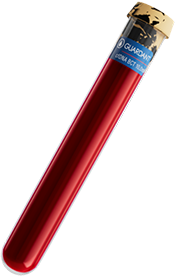Offer your patients Shield-the patient preferred CRC screening test7,10
2.5x more patients said "yes" to screening with Shield, compared with usual care10
People who are not up to date with screening are at increased risk of colorectal cancer (CRC)1
Did you know?
CRC is highly preventable, yet
75% of people who died
from it were due for screening1,2
CRC is still the 2nd-leading cause of cancer-related deaths3
Compliance rates remain stagnant and low2
Current CRC screening methods |
Compliance rates |
|---|---|
Stool tests4,5 |
14-67% |
Colonoscopies5,6 |
38-50% |
Due to compliance barriers with these existing modalities, many patients continue to go unscreened6
Shield™ is an accurate blood test that can help overcome barriers and increase compliance7,8
ECLIPSE validates Shield as a high-sensitivity blood test for CRC screening that is easy to complete
Specificity8,†
90%
Sensitivity8,†
83%
CRC Overall
High compliance rate in real-world clinical settings
90%9,*
90%9,*

*Compliance rate for the first 8,000 patients that were prescribed Shield and completed it.9
†The ECLIPSE study (NCT04136002) is comparing the sensitivity and specificity of Shield with findings from subsequent colonoscopy in over 10,000 average-risk patients.9,11 Patients had no prior diagnosis of CRC, inflammatory bowel disease, or family history of genetic risk for CRC (eg, Lynch syndrome). Specificity detected for advanced neoplasia in ECLIPSE includes CRC and advanced adenomas; overall sensitivity shown is for CRC.11
Shield™ is a qualitative laboratory developed test intended to detect colorectal neoplasia by identifying genomic and epigenomic alterations in cell-free DNA in plasma from blood collected in Guardant blood collection tubes.
- The assay is intended to be complementary to and not a replacement for current recommended colorectal cancer screening methods
- Patients with an “abnormal signal detected” Shield result should be referred for colonoscopic evaluation
- A “normal signal detected” Shield result does not preclude the presence of colorectal neoplasia, and patients should continue participating in guideline-recommended screening programs
- Shield was developed, and its performance characteristics determined, by the Guardant Health Clinical Laboratory in Redwood City, CA, USA, which is certified under the Clinical Laboratory Improvement Amendments of 1988 (CLIA) as qualified to perform high complexity clinical testing. This test has not been cleared or approved by the US FDA
References
1. Doubeni CA, Fedewa SA, Levin TR, et al. Modifiable failures in the colorectal cancer screening process and their association with risk of death. Gastroenterology. 2019;156(1):63-74.e6 doi:10.1053/j.gastro.2018.09.040
2. American Cancer Society. Colorectal Cancer Facts & Figures 2020-2022. Atlanta: American Cancer Society; 2020.
3. American Society of Clinical Oncology. Colorectal cancer: statistics. Cancer.net website. February 2023. Accessed November 8, 2023. https://www.cancer.net/cancer-types/colorectal-cancer/statistics
4. Gellad ZF, Stechuchak KM, Fisher DA, et al. Longitudinal adherence to fecal occult blood testing impacts colorectal cancer screening quality. Am J Gastroenterol. 2011;106(6):1125-1134. doi:10.1038/ajg.2011.11
5. Inadomi JM, Vijan S, Janz NK, et al. Adherence to colorectal cancer screening: a randomized clinical trial of competing strategies. Arch Intern Med. 2012;172(7):575-582. doi:10.1001/archinternmed.2012.332
6. Denberg TD, Melhado TV, Coombes JM, et al. Predictors of nonadherence to screening colonoscopy. J Gen Intern Med. 2005;20(11):989-995. doi:10.1111/j.1525-1497.2005.00164.x
7. Liles EG, Coronado GD, Perrin N, et al. Uptake of a colorectal cancer screening blood test is higher than of a fecal test offered in clinic: a randomized trial. Cancer Treat Res Commun. 2017;10:27-31. doi:10.1016/j.ctarc.2016.12.004
8. Chung DC, Gray DM, Greenson J, et al. Clinical validation of a cell-free DNA blood-based test for colorectal cancer screening in an average risk population. Abstract presented at: Digestive Disease Week 2023; May 6-9, 2023; Chicago, IL. #913e.
9. Guardant Health announces positive results from pivotal ECLIPSE study evaluating a blood test for the detection of colorectal cancer. December 15, 2022. Accessed November 8, 2023. https://investors.guardanthealth.com/press-releases/press-releases/2022/Guardant-Health-announces-positive-results-from-pivotal-ECLIPSE-study-evaluating-a-blood-test-for-the-detection-of-colorectal-cancer/default.aspx
10. Johnson, CA, et al. “I Was Screaming Hallelujah”: Patient and Provider Perceptions of Blood-Based Testing for Colorectal Cancer Screening. P3169. Poster presented at ACG 2023 ePoster hall; October 24, 2023. https://acg2023posters.eventscribe.net/fsPopup.asp?efp=RVdKUVpPTUUyMDQ1MQ&PosterID=597452&rnd=0.1262501&mode=posterInfo
11. National Library of Medicine, ClinicalTrials.gov. Evaluation of the ctDNA LUNAR test in an Average Patient Screening Episode (ECLIPSE). NCT04136002. Available at https://classic.clinicaltrials.gov/ct2/show/NCT04136002. Accessed November 8, 2023.
